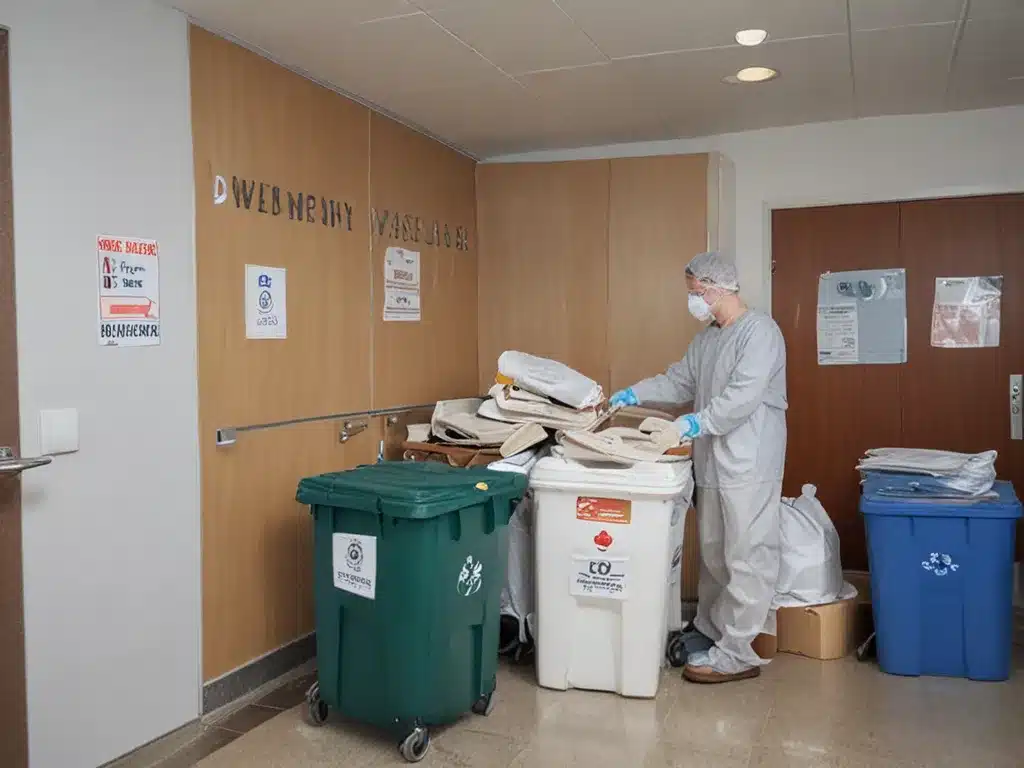Medical waste disposal is an important aspect of healthcare operations that helps protect public health. There are various regulations at the federal, state, and local levels that dictate how medical waste must be handled, transported, and disposed of properly. In this article, I will provide an in-depth look at the key regulations surrounding medical waste disposal in the United States.
Federal Regulations
At the federal level, the main agency that regulates medical waste is the Environmental Protection Agency (EPA). The key regulations include:
Resource Conservation and Recovery Act (RCRA)
The RCRA, passed in 1976, gives the EPA authority to regulate hazardous waste from “cradle-to-grave.” This includes the generation, transportation, treatment, storage, and disposal of hazardous medical waste. The RCRA regulations establish a comprehensive management system for hazardous waste handlers.
Key provisions relevant to medical waste include:
-
Hazardous waste identification – Outlines processes to determine if waste is hazardous. Infectious medical waste is considered hazardous.
-
Generator requirements – Standards for hazardous waste handling, manifesting, transporting, record keeping, and reporting.
-
Transporter requirements – Regulations for transporting hazardous medical waste.
-
Treatment, storage and disposal requirements – Rules for facilities that treat, store, or dispose of hazardous medical waste.
Medical Waste Tracking Act
The Medical Waste Tracking Act of 1988 established a 2-year federal program for states to track medical waste from its point of generation to disposal. The tracking program involved special packaging, labeling, reporting, and record keeping requirements. The program expired in 1991, but some states have maintained their own tracking systems.
Needlestick Safety and Prevention Act
This 2000 law revised the Bloodborne Pathogens Standard to establish new requirements for employers to help protect healthcare workers from needlestick injuries. Provisions include:
- Evaluating and using safer medical devices like retractable or self-sheathing needles.
- Involvement of frontline healthcare workers in identifying and choosing devices.
- Maintaining a sharps injury log.
- Needle and sharps disposal requirements.
OSHA Standards
The Occupational Safety and Health Administration (OSHA) Bloodborne Pathogens Standard also contains regulations related to medical waste. Key requirements include:
-
Proper containment – Medical waste must be placed in closable, leak-proof containers clearly marked as biohazardous.
-
Management plan – A written plan must address handling, storage, treatment and disposal.
-
Employee training – Workers must receive training on proper medical waste handling.
OSHA’s Hazard Communication Standard also requires facilities to maintain Safety Data Sheets for hazardous disinfectants and other chemicals.
DOT Shipping Requirements
The U.S. Department of Transportation (DOT) Hazardous Materials Regulations apply to transporting medical waste:
-
Shipping papers – Must accompany any transport of hazardous medical waste.
-
Packaging – Medical waste must be properly labeled and packaged in DOT approved containers.
-
Training – Employees involved in transport must receive hazardous materials training.
State Medical Waste Regulations
Many states have their own medical waste regulations that healthcare facilities must follow in addition to federal requirements. These may include:
-
Licensing or registration – For generators, transporters, and disposal facilities.
-
Manifesting – Paperwork tracking waste from generation to disposal.
-
Treatment and disposal methods – Prescribing acceptable treatment like autoclaving or incineration.
-
Category definitions – States may have specific definitions for infectious waste, pathology waste, sharps, pharmaceuticals, etc.
For example, California’s Medical Waste Management Act contains extensive regulations for all aspects of medical waste management within the state.
Local and City Ordinances
Local jurisdictions like cities and counties may have their own medical waste ordinances as well. These rules institute requirements like:
- Permitting for transporting companies.
- Packaging and labeling standards.
- Restrictions on treatment or disposal methods.
Healthcare facilities need to check with local authorities to ensure compliance with any municipal regulations.
Key Takeaways
The web of regulations surrounding medical waste disposal involves agencies at the federal, state, and local levels. Key takeaways include:
-
EPA regulations establish a cradle-to-grave system for tracking and managing hazardous medical waste.
-
OSHA standards aim to protect healthcare workers from bloodborne pathogens and other hazards when handling waste.
-
DOT rules govern transporting and shipping medical waste.
-
State regulations add additional licensing, manifesting, treatment, and disposal requirements.
-
Local ordinances may include permitting, packaging, and treatment restrictions.
Healthcare facilities must understand this complex regulatory landscape to ensure their medical waste disposal procedures comply with all applicable laws and protect public health. Proper compliance takes an ongoing, concerted effort.







